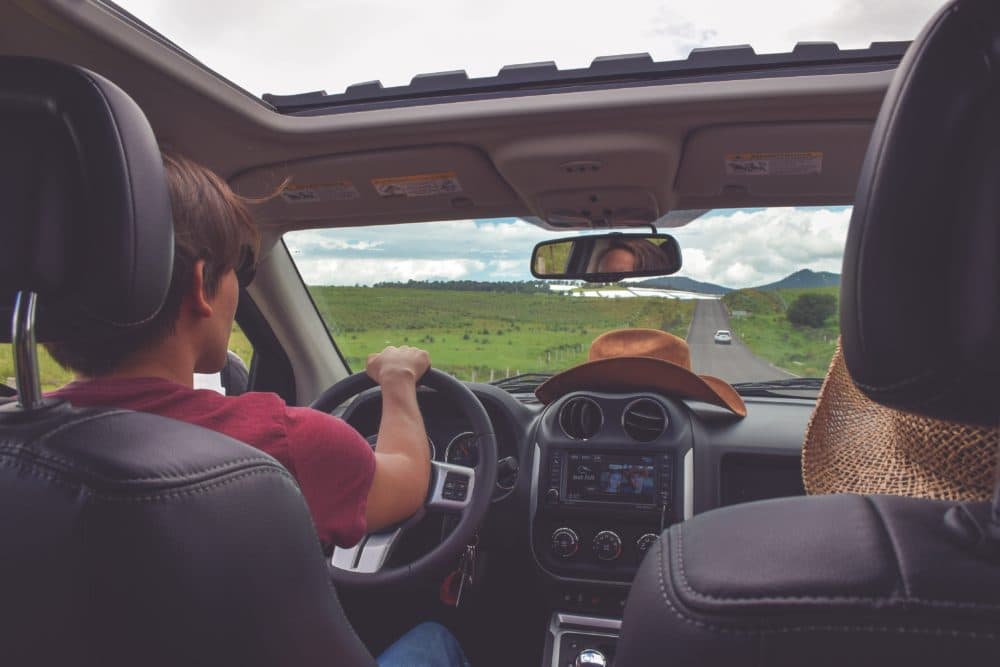Advertisement
Commentary
Why Doesn’t My Teenager Want To Drive?

My first car was a jaundice-yellow 1978 Buick LaSabre. It was a popular target for a pack of boys who drove around my hometown with paint guns. Because I rarely washed the thing, it accumulated pops of color — an orange spray on the left back door, blood red on the passenger side window, a brown shape on the fender — until it resembled a mobile Jackson Pollack canvas.
I loved that car. And I couldn’t wait to drive. Getting my license was a huge rite of passage. With keys jangling in my hand, I walked the concrete-brick halls of my high school with confidence, planning my next free-period escape to the local diner.
Maybe you know what I’m talking about, because maybe you felt the same way about getting your license.
Now I am the mother of a 16-year-old son who has his learner’s permit, but doesn’t really seem like he wants to drive. I thought this was a bit odd, until I started asking around. Turns out, my son’s not alone. While several of his friends either have their licenses already or are actively driving their white-knuckled parents around as they learn to navigate the roads, many of his peers seem to be in no hurry to drive.
... the number of high school seniors who drive dropped from 85.3 percent in 1996 to 71.5 in 2015, a record low for the age group.
According to a recent study by the University of Michigan Transportation Research Institute, the number of Americans in general — and teenagers in particular — getting their driver’s licenses has declined steadily over the past 30 years. Data from Michigan’s Monitoring the Future survey, which is a continuing study of American youth, shows the number of high school seniors who drive dropped from 85.3 percent in 1996 to 71.5 in 2015, a record low for the age group.
Why is this generation of teenagers so blasé about driving? What's behind their lack of motivation to get behind the wheel?
When asked, my son said three things: “It’s hard. I’m not good at it. And, why do I even have to?” His reasoning may not sound scientific, but, on closer inspection, it actually lines up perfectly with the data.
“It’s hard.” Indeed. Thanks to graduated licensing laws, it’s much more difficult today to get one’s license than it was in the 1980’s, when I was learning to drive. In Rhode Island, where we live, in addition to taking the 33-hour driver’s ed course and a permit exam, a 16- to 18-year-old new driver must hold their provisional license for at least six months and also complete at least 50 hours of supervised driving with an adult. Additionally, parents of new drivers may soon be required to head back to school themselves. In the spring of 2017, a bill requiring parents of new drivers to take a free, two-hour refresher safety class passed in the Rhode Island House and Senate. (The bill still needs to be signed into law by Governor Raimondo and then approved by the state’s Department of Education.)
Advertisement
“I’m not good at it.” It’s true; he’s bad at it. In fact, 16- and 17-year-olds are three times more likely to be involved in a deadly crash than other drivers, according to a 2017 AAA report. Even with hands-free laws in place, distracted driving, including texting, is still a major concern for teens, as is speeding and not wearing seatbelts. Adoption of the parent driving class mentioned above has helped curb those numbers. Massachusetts, for example, saw a 50 percent drop in teen accidents over a five-year period after a parent class was introduced.
If my mom drives me everywhere, do I really need to do it myself?
“And why do I even have to?” In other words, if my mom drives me everywhere, do I really need to do it myself? Also, if there’s nowhere to go, why should I leave my bedroom? And, perhaps most importantly, if I don’t have a car, does driving really exist? In response to my son’s final, vague comment on the subject of driving, I turned to a study published in 2017 in the journal “Child Development” and reported on in the Washington Post:
… teenagers are increasingly delaying activities that had long been seen as rites of passage into adulthood…the percentage of adolescents in the United States who have a driver’s license, who have tried alcohol, who date and work for pay has plummeted since 1976, with the most precipitous decreases in the past decade.
Years ago, children were expected to work and provide for their families, which led to growing up faster. Nowadays, teens from all backgrounds are encouraged to remain children longer — to stay in school, to put off work, marriage, childbearing and other adult activities. If you don’t work, it’s hard to buy a car, much less pay for the gas for that car — a 2012 study found that not having a car was the most common reason teens gave for not getting their licenses.
Combine those facts, with helicopter parenting that meets a child’s every need, ride-sharing options like Uber, and technology that brings friends and unlimited virtual entertainment — without ever having to leave the house — and there is little impetus for wanting to get behind the wheel.
That is, until the first day of 11th grade, when my son realized at 2:10 p.m. that he had to get on the overheated, bright yellow school bus … with a bunch of middle schoolers. “#embarrassed,” he texted me. “Getting a ride with Eli.”
The next day, he put his learner’s permit to use and drove himself to school.
